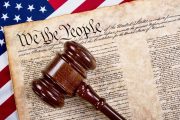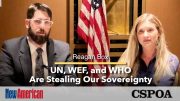
The Ninth Circuit Court of Appeals held this week that the NSA’s telephone dragnet surveillance qualifies as a search, marking the program illegal, but stopping short of declaring it unconstitutional.
“[T]he government may have violated the Fourth Amendment and did violate the Foreign Intelligence Surveillance Act (“FISA”) when it collected the telephony metadata of millions of Americans,” the three-judge panel unanimously opined.
Regarding when the data gathered by the NSA — or any of the several federal agencies conducting unwarranted surveillance of American citizens — the court held that:
“[T]he Fourth Amendment requires notice to a criminal defendant when the prosecution intends to enter into evidence or otherwise use or disclose information obtained or derived from surveillance of that defendant conducted pursuant to the government’s foreign intelligence authorities.”
Remarkably, despite its reasoning, the court decided that the evidence against the four Somali nationals challenging the NSA’s gathering of their telephone data did not violate the law and the evidence was permitted as the judges held that the metadata surveillance and seizure was so minor as to not prejudice the convictions.
The defendants in this case were convicted in 2013 of “sending, or conspiring to send, $10,900 to Somalia to support a foreign terrorist organization.”
In the opinion, written by Judge Marsha Berzon, there are several references to Edward Snowden, the NSA subcontractor who exposed the agency’s wholesale surveillance of nearly every aspect of the electronic communications within the United States, including the telephone metadata of millions of American citizens, unaware that their private communications were being wiretapped.
Responding to news of the court’s opinion, Snowden tweeted:
“Seven years ago, as the news declared I was being charged as a criminal for speaking the truth, I never imagined that I would live to see our courts condemn the NSA’s activities as unlawful and in the same ruling credit me for exposing them.”
Snowden released a trove of documents revealing that the NSA was conducting surveillance under the pretense of monitoring foreign targets, but any U.S. communication caught in the dragnet was “collected, retained and used.”
The surveillance program was initiated by George W. Bush in 2001 and his been renewed several times since then.
Additionally, using Section 215 of the Patriot Act as justification, the NSA is known to monitor and seize the phone records of millions of Americans who are not now or ever have been suspected of any crime that would justify the issuing of a search warrant.
All these activities violate the Fourth Amendment requirement that “no warrants shall issue, but upon probable cause, supported by oath or affirmation, and particularly describing the place to be searched, and the persons or things to be seized.” In practical terms, that means that the federal government cannot purposely monitor the phone or Internet communications carried on by an American or a person inside the United States without a qualifying warrant.
Now, the Ninth Circuit Court of Appeals has issued its opinion that the telephony metadata gathering must be connected to a specific investigation, not conducted indiscriminately, as the NSA has done for 19 years.
It is noteworthy that a close reading of Judge Berzon’s opinion reveals that her reasoning was not guided by the U.S. Constitution. In the 59-page opinion, she wrote, “Having carefully reviewed the classified FISA applications and all related classified information, we are convinced that under established Fourth Amendment standards, the metadata collection, even if unconstitutional, did not taint the evidence introduced by the government at trial.”
In other words, her holding that the surveillance program at issue in this case was illegal would not have changed, even if the program was unconstitutional!
What Judge Berzon must not have learned in law school (I didn’t learn it, so I assume she didn’t either) is that the U.S. Constitution is the contract wherein the entirety of the authority of the federal government is set out. Within the four corners of that document is found every power that the states granted to the general government. There is not a single syllable in the U.S. Constitution that could be reasonably construed to grant to the federal government power to conduct warrantless wiretaps of the phones of American citizens. In fact, as recited above, the Fourth Amendment explicitly forbids such a scheme.
Apparently, such constitutional gymnastics take time to perform. The case under review by the Ninth Circuit Court was submitted to that court seven years ago: in November 2013!
In January of this year, the Second Circuit Court of Appeals held that warrantless surveillance did not violate the Fourth Amendment, so there is no constitutional consistency, even among those who many believe are the ultimate arbiters of the metes and bounds of the U.S. Constitution.
Despite that lengthy postponement of justice, the case isn’t over. Any of the parties could file a request that the case be submitted to an 11-judge panel and an appeal to the U.S. Supreme Court is possible, too.
Finally, none of this should matter as much as it does. The federal courts are not given authority in the U.S. Constitution to be the final word on that document.
Regardless, the situation is now as Thomas Jefferson feared it would become:
BEGIN INDENTED QUOTE
At the establishment of our constitutions, the judiciary bodies were supposed to be the most helpless and harmless members of the government. Experience, however, soon showed in what way they were to become the most dangerous; that the insufficiency of the means provided for their removal gave them a freehold and irresponsibility in office; that their decisions, seeming to concern individual suitors only, pass silent and unheeded by the public at large; that these decisions, nevertheless, become law by precedent, sapping, by little and little, the foundations of the constitution, and working its change by construction, before any one has perceived that that invisible and helpless worm has been busily employed in consuming its substance.
END INDENTED QUOTE



